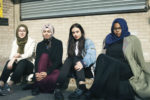Two weeks ago, a mother in a headscarf was threatened by a woman with a knife while she was trying to pick up her children outside their school. According to an article published on the website of the Collectif contre l’islamophobie en France (CCIF, Collective against Islamophobia in France), the woman screamed, “What is wrong with you, bitch, I will take off your headscarf” and “God doesn’t know you” (the second quote from Le Parisien).

Image of Joliot-Curie School via Google Maps.
Again according to the CCIF article, this is not the accused’s first offense, and yet strangely, before the trial date set in September, no other measures were taken as is customary in these cases, such as forbidding the woman access to school grounds. Think about it: if a violent husband had pulled a knife on his ex-wife, had a Muslim pulled a knife on ANYONE, don’t you think there would have been some kind of restraining order? Yet the mother is left in a situation where she is afraid to even let her kids go to school, much less pick them up herself. Would you take your kids back to a place or go there yourself if someone pulled a knife on you the last time you went? And then you have people trying to say that Islamophobia is not a thing.
It is also important to note that out of all the large French dailies, only the tabloid Le Parisien (analogous to USA Today) picked this story up and most of what I have read on this topic are from private Muslim websites. When Islam and Muslims are used as political tools, veiled women are at the front lines. Bigger French newspapers were happy to write about Muslims in past weeks, but only within the framework of the tropes on “radicalization” and “secularism.” Even Kamel Daoud’s rather strange viewpoints on Arab/Muslim sexuality got a ton of page views (but wait, there’s more: in Monday’s papers, he announces he will stop journalism, tired of being called an islamophobe) . But somehow, news about a Muslim victim isn’t click-baity enough.
The narratives surrounding Islam and Muslims affect us all. If a veiled mother gets assaulted with a knife and nothing happens, don’t you think the public perception of Muslims as perpetrators rather than targets is part of the problem? The thing is, Muslims are political targets, and this in a lot of countries. Look what Donald Trump said recently in the United States about dipping bullets for Muslims in pigs’ blood. This man is a front-runner in a major election and no one, generally speaking, finds his little islamophobic murder story unsettling enough to seriously question his candidacy in his circles. Elisabeth Badinter, a French feminist cited in the link above from Mediapart, said that one “shouldn’t be afraid to be treated as an Islamophobe” – in other words, that being anti-Muslim is okay.
We don’t live in a vacuum. If Muslims were not political targets, if hate speech towards Muslims was not so well-tolerated, maybe this mother and her children could go to school without fear. In the wake of the Paris attacks last year, it is important to understand that Muslims can also be victims (shocking, I know). May this mother have justice.




